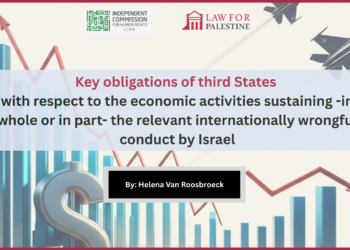Call for Papers and Articles: The Responsibility of Palestinian Armed Groups Before the International Criminal Court
Law for Palestine (L4P) is glad to announce that we are now receiving papers and articles concerning the Situation of Palestine in the International Criminal Court.
We welcome submissions from law scholars, early career scholars and academicians from all parts of the world. Co-authored papers are acceptable, but all authors must meet the eligibility criteria below. The papers and articles that meet the publication criteria of L4P will be published on our website and their authors will be awarded a member status in the Jurists for Palestine Forum for 3 months. Moreover, L4P will promote those writings on social media.
Papers must be primarily based on the concept note made by L4P on this month’s topic (each month has its own theme – for this month’s theme, please check the details below).
March theme:
On March 3, 2021, ICC Prosecutor, Fatou Bensouda, has confirmed the initiation by its office of an investigation respecting the Situation in Palestine, which is expected to have substantial repercussions considering the high sensitivity of the issue. This Prosecutor’s decision has come after the February 5, 2021 announcement by the ICC Pre-Trial Chamber I of its long awaited decision regarding its territorial jurisdiction on the alleged crimes committed on the occupied Palestinian territories; the West Bank including Jerusalem, and the Gaza Strip.
While the ICC Prosecutor Fatou Bensouda announced that there is a “reasonable basis to believe” that individuals in the Israeli Defense Army have committed war crimes, such as murder, targeting civilians, and settlements, she also found that “there is a reasonable basis to believe” that members of Hamas and other Palestinian armed groups have committed war crimes through targeting Israeli civilians, using Palestinian civilians as human shields, denying persons their right to access to an impartial court, and torture.
As for the question of admissibility, the Prosecutor initially found that the information provided on the Israeli measures against the alleged crimes committed in Gaza is insufficient and still requires further evaluation. However, she found that the alleged war crimes committed by Palestinian factions would be admissible.
In light of the aforementioned, we present the following points and questions as a general framework for research over the responsibility of the Palestinian factions, so that each of them would be the basis for a specialized paper or article. We hope that papers would take into consideration the Palestinian context and the careful application of the rules of international humanitarian law, as well as the temporal and ratione materiae (subject-matter) of the Court.
- Civilians Immunity Principle: How is this principle applies in the operations against Israel? How is it related to the principle of distinction, untargeted rockets, and the accusation of using civilians as human shields? Who can be considered as a civilian or a combatant in the Gaza Strip? What of armed civilians? When does a civilian lose the status of a ‘civilian’? in which circumstances would a civilian be treated as a combatant? What are the consequences of that?
- Duty to take Feasible Precautions in Armed Conflicts: What does this principle mean? And how is it applicable in the Gaza Strip? How is it related to the principle of ‘identifying the legitimate military target’? how is it related to the targets of the Palestinian armed factions? Did they meet this principle? Would the televised warnings of the Palestinian factions be regarded as an ‘effective warning’? does disregard ‘effective warnings’ exempt the other side from respecting it?
- Principle of distinction: What does it mean? How is it applicable to the Palestinian factions? How has it been practiced in the Gaza Strip? Who is a combatant and who is a civilian? How is it related to the ‘direct involvement’ in the conduct of hostilities?
- Indiscriminate attacks: What does this principle entail and what are its criteria? Do all Palestinian rocket attacks fall under this category? What about those attacks done with the intention of intimidation? How is this principle treated in the case of asymmetric wars (huge imbalance of power)?
- Principle of proportionality: What does it entail? How is it related to targeting civilians? Is it related to the number of casualties? And how is it related to the principle of self-defense? Can self-defense be invoked to justify breaching this principle? How is it related to the concept of ‘collateral damage’?
- Bearing the Greatest Responsibility / Most Responsible: What does this concept mean? Which international tribunals and courts used it before and how? Is there a basis for the ICC to invoke it in the Case of Palestine? How would it use it and how would it affect the proceedings?
- Gravity of the crime: What are the criteria of ‘gravity’? does it apply to the actions of the Palestinian factions? How did the Court deal with it previously? Would it cause an obstacle in terms of raising the threshold for prosecution?
- Prohibition of the use of civilians as human shields: What does it mean and what are its criteria? How is it applicable in the Gaza Strip? Does using civilian areas to launch military actions fall under this? What about small-size territories densely populated like Gaza? In case it has been proved that the Palestinian factions breached this principle, does this exempt Israel from its responsibility to refrain from targeting civilians? How is it related to the principles of distinction and proportionality? In case of consent to be a human shield, does this remove the status of a ‘civilian’ and make them directly involved in hostilities? In case of refusing to respond to the Israeli warnings and empty buildings to be bombed, would that turn the civilians automatically into human shields?
Please submit your initial suggested outlines on one of the above topics:
– The deadline for submitting the outlines is March 9, 2021. (The deadline is extended to March 14, 2021).
– After submitting the article outline, you will get our response (approval/rejection) within 5 days. You are then given 10 days to submit the full article.
– The approved papers and articles will be published before the end of April 2021.





